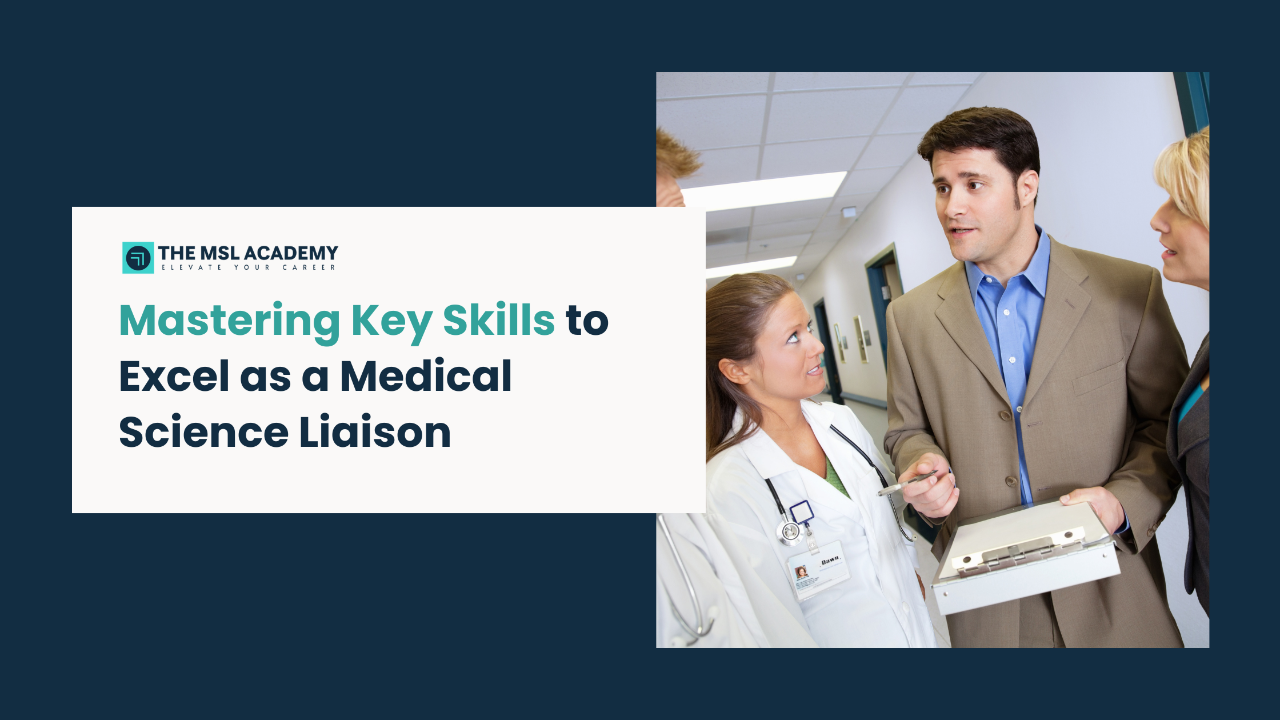Mastering Key Skills to Excel as a Medical Science Liaison
Feb 08, 2025
The role of a Medical Science Liaison (MSL) is one of the most dynamic and rewarding careers in the pharmaceutical and biotechnology industries. It’s a perfect blend of science, communication, and strategic collaboration, offering professionals the opportunity to make a tangible impact on patient care while advancing cutting-edge therapies.
But success as an MSL doesn’t just come from a deep understanding of science. It requires a unique set of skills, from the ability to distill complex data into actionable insights to fostering relationships with Key Opinion Leaders (KOLs) and aligning your efforts with organizational goals.
In this guide, we’ll break down the core competencies every MSL must master and provide actionable strategies to hone those skills. Whether you’re an aspiring MSL or a seasoned professional, these insights will help you excel in this competitive field.
1. Scientific Expertise: The Core of MSL Excellence
Scientific expertise is the foundation of the MSL role. As an MSL, you’re expected to be the go-to expert in your therapeutic area. This means staying on top of the latest clinical research, treatment guidelines, and scientific advancements.
Why It’s Essential
KOLs and healthcare professionals (HCPs) rely on MSLs to provide accurate, up-to-date, and unbiased information. Your scientific knowledge not only establishes your credibility but also forms the basis for meaningful scientific discussions.
How to Build and Maintain Scientific Expertise
- Stay Current: Regularly read peer-reviewed journals, clinical trial updates, and therapeutic guidelines.
- Attend Scientific Events: Participate in medical conferences, symposia, and webinars to stay informed about the latest developments in your field.
- Leverage Online Tools: Use databases like PubMed and clinicaltrials.gov to find relevant studies and gain insights into ongoing research.
Pro Tip: Dedicate time each week to review emerging literature. Keeping a "scientific journal" where you summarize key findings can help solidify your knowledge and prepare you for future discussions.
2. Communication Skills: Making Complex Science Accessible
Communication is at the heart of the MSL role. Whether you’re presenting clinical data to KOLs, responding to questions from HCPs, or collaborating with internal teams, your ability to convey complex scientific information in a clear and engaging way is critical.
Why It’s Essential
The success of your engagements depends on your ability to tailor your message to different audiences. An oncologist might need an in-depth analysis of trial data, while a marketing colleague may require high-level takeaways to shape a strategy.
How to Enhance Communication Skills
- Practice Active Listening: Pay close attention to what your audience is asking and adjust your response accordingly.
- Focus on Clarity: Avoid jargon and break down complex concepts into simpler terms when necessary.
- Use Visual Aids: Incorporate visuals like graphs, charts, and infographics to make data easier to digest.
- Refine Presentation Skills: Practice delivering presentations in front of peers or mentors and ask for feedback on your delivery, tone, and content.
Pro Tip: Record yourself delivering a mock presentation. This allows you to review your tone, pace, and clarity, helping you identify areas for improvement.
3. Relationship-Building: Creating Meaningful Connections
Establishing trust and credibility with KOLs and HCPs is one of the most important aspects of being an MSL. Your ability to foster strong relationships can lead to better collaborations, deeper scientific exchanges, and long-term partnerships.
Why It’s Essential
KOLs are often busy professionals, so building rapport and becoming a trusted resource ensures they prioritize engaging with you. Strong relationships also enable you to gather valuable field insights that benefit your organization.
How to Build Strong Relationships
- Be Genuine: Approach each interaction with authenticity and a genuine desire to provide value.
- Do Your Homework: Research each stakeholder’s clinical interests and tailor your discussions to their specific needs.
- Follow Up: After meetings, send personalized follow-ups summarizing key takeaways and offering additional resources.
- Be Consistent: Regularly check in with your network, even if you don’t have new data to share. Consistency builds trust.
Pro Tip: Keep a CRM (Customer Relationship Management) system or a simple tracker to log details about your interactions with KOLs. This helps you maintain personalized and meaningful follow-ups.
4. Strategic Thinking: Aligning Science with Business Goals
While the MSL role is rooted in science, it’s also highly strategic. You’ll need to align your activities with broader organizational objectives, whether it’s supporting a product launch, gathering insights to inform clinical trial design, or preparing the market for a new therapy.
Why It’s Essential
By understanding and contributing to your company’s strategic goals, you’ll demonstrate your value as both a scientific expert and a key business partner.
How to Develop Strategic Thinking Skills
- Understand Your Organization’s Goals: Familiarize yourself with your company’s therapeutic pipeline, business objectives, and market strategy.
- Anticipate Trends: Stay informed about industry trends and anticipate how they might impact your therapeutic area.
- Gather Insights: Use your interactions with KOLs to collect valuable field insights and relay them to internal teams.
Pro Tip: Schedule regular meetings with your Medical Affairs or cross-functional team to align on priorities and ensure your efforts contribute to broader goals.
5. Networking: Expanding Your Influence
Your professional network is one of your greatest assets as an MSL. Building connections with KOLs, peers, and industry professionals opens doors to collaborations, insights, and career opportunities.
Why It’s Essential
Networking not only helps you stay informed about industry developments but also positions you as a visible and engaged professional in the Medical Affairs community.
How to Build and Leverage Your Network
- Attend Events: Join medical conferences, workshops, and webinars to meet professionals in your field.
- Join Professional Organizations: Become a member of groups like the Medical Affairs Professional Society (MAPS) or The MSL Academy’s community to access exclusive resources and connections.
- Engage on LinkedIn: Share relevant articles, participate in discussions, and connect with thought leaders in your therapeutic area.
Pro Tip: After meeting someone at an event or conference, send a follow-up message within 24 hours to solidify the connection and express interest in staying in touch.
How to Hone These Skills
Mastering these competencies takes time and dedication, but here’s how you can accelerate your growth:
- Leverage Training Programs: Programs like those offered by The MSL Academy provide tailored resources to help you build key skills and succeed in your role.
- Seek Mentorship: Find a mentor within the industry who can provide guidance, feedback, and real-world insights.
- Practice Regularly: Treat every interaction as an opportunity to refine your skills.
The MSL role offers a rare opportunity to combine your passion for science with meaningful relationships and strategic impact. It’s not just a job—it’s a chance to drive change in healthcare, elevate patient outcomes, and be at the forefront of medical advancements. But excelling in this role takes more than technical knowledge. It requires you to master communication, build authentic connections, and align your efforts with both stakeholder needs and organizational goals.
So, how do you rise to the top in such a competitive field?
That’s where The MSL Academy comes in. Whether you’re just starting your journey or looking to sharpen your skills, our programs are designed to give you the tools, training, and confidence you need to thrive as an MSL. From personalized career guidance to hands-on resources, we’re here to help you:
- Master the skills that set top MSLs apart.
- Build meaningful relationships with KOLs and peers.
- Navigate the complexities of Medical Affairs with ease.
Your dream MSL career starts here. Let’s work together to make it happen.
Explore our professional development resources, training programs, and networking opportunities, and see how The MSL Academy™ can help you not only meet the demands of the role but exceed them.
Ready to take the leap? Join us today! Book Your Free Discovery Call Now!



